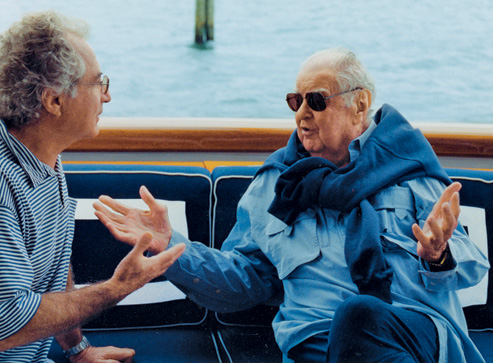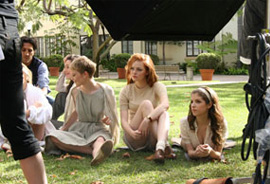
Madoff with Norman F. Levy on the older man’s yacht. By Carmen Dell’Orefice.
Once, after Levy’s health began to fail, Madoff arranged for a helicopter to transport him for medical treatment. And when Levy died, in 2005, at 93, Madoff delivered a eulogy at the funeral. “Norman told me that Bernie was the executor of his will,” said Carmen. “Before Norman passed away, there was the Betty and Norman F. Levy Foundation,” she said, referring to the charitable institution Levy had founded with his late wife and left to his heirs, with a reported $244 million in assets in 2007, to be used for causes ranging from cancer research to Yeshiva University. “Long before he died, he had given both of his children their own money, and each had created a charitable foundation. All three foundations closed after December 11,” she said—the day Madoff admitted to F.B.I. agents that his investment fund, into which approximately 13,500 individual investors and charities had put their money, was “one big lie.” (Both of Levy’s children, Jeanne Levy-Church and Francis Levy, declined to comment.)
After Levy’s death, Carmen said, she went out to dinner several times with the Madoffs. But she got the news of Bernie’s arrest by telephone. “At ten minutes to five, Lillian, a girlfriend, called me up. Lillian had $400,000 with him, all she had in her life, and she’s 68. She said, ‘Are you all right?’ I said, ‘Of course I’m all right. Why?’ She said, ‘You didn’t hear yet?’ I said, ‘Hear what?’ She said, ‘They’ve arrested Bernie Madoff!’ And I said, ‘For what?’ And she said, ‘It’s all a fraud. Turn on the television.’ By five minutes to five, I had moved past the fact that everything I thought I had on paper was gone. Ten minutes past five, I called Bernie’s private office number, and a secretary picked up,” she continued. “I said, ‘This is Carmen Dell’Orefice.’”
“We just found out less than 45 minutes ago,” the secretary said.
“Then it’s so?”
“It seems so. I don’t know,” she said.
At that point in her story, Carmen shook her head. “I am accepting that what I thought I was experiencing was a projection of a person who wasn’t there. If I didn’t take all the pictures I took all those years, I would say, ‘Carmen, you’re delusional.’ I know these people did not start out doing harm. So many people have been hurt, I feel badly about trying to say anything good. But I’m starting from where I was knowing them. Because I’m hurt, too. For the second time in my life, I’ve lost all of my life savings.”
At seven p.m. on December 11, Carmen got a call from Norman Levy’s daughter, Jeanne Levy-Church, who contributed millions to good causes around the world through her JEHT Foundation. (The name stands for Justice, Equality, Human dignity, and Tolerance.) “She said, ‘I just want you to know: at four o’clock today, I had to close down my foundation.’”
Sitting there in Carmen Dell’Orefice’s Park Avenue bedroom, listening to this elegant, charming woman speak about the Bernie Madoff she had known before his Waterloo, I realized that her remembrance of him as a generally quiet, caring, devoted little man was the most damning testimony I had heard yet. I thought to myself, If a son could loot the fortune of his father, what would he do to a stranger?
“Playing the Spread”
In truth, I had been trying for months to invest money with Madoff. As the stock market fell precipitously in the fall of 2008, I would hear my friends in Aspen, Colorado, the affluent resort town where I live, gloat about the kindly Jewish uncle, the financial genius, who didn’t just keep their money safe but paid dividends, while everyone else’s portfolio plummeted by 40 percent. “Bernie’s gone to cash,” one said. “Bernie’s in Treasury bills,” said another. “Thank God for Bernie!” said a third.
In November, I invited a friend and longtime Madoff investor to dinner and literally begged him to get me in. He listened politely, then shook his head slowly. “Forget it,” he said. Bernie was closed; Bernie had a multi-million-dollar minimum; Bernie didn’t need my money. His discouraging response only made me want Bernie all the more.
A few weeks later, on December 11, I was trying my luck again. My wife and I were having dinner in another Aspen restaurant with another friend, who, thanks to investing with Madoff for 20 years, had recently retired to a life of golf and skiing. In the course of the evening, the cell phone of the investor’s companion rang a number of times, but she didn’t answer right away. When she finally did, she came away with unbelievable news: Bernie Madoff had been arrested and had reportedly confessed to cheating clients of nearly $50 billion in a Ponzi scheme. Within hours we knew that half a dozen of our friends had been hit, and that my dinner companion’s retirement was over.
Once the cell phones started ringing on the slopes, that day and the next, a previously unknown social class emerged in the fancy resort: the newly needy. People rushed home, where the flat screen was filled with the news, and gradually came to realize that one life was gone and another had begun. “Hysterical” was how one man described to me the mood in his home, adding that the hysteria was followed by humiliation and shame. As another said, Who wants to go out in a resort town where people are celebrating if you can’t pay a restaurant tab and everybody around you knows it?
As Christmas turned to New Year’s, the roster of the stricken had ballooned—too many to believe. How the Madoff pox had found its way to the Rockies and spread, however, was still unclear. Bernie had been in Aspen, people said, as had his brother, Peter, but never to solicit blatantly. Soon I knew of approximately 50 investors in Aspen who had been stung. As one of them told me, when the stock market began to slide, they had begun shifting “from the losers to the winners,” until some of them had everything except their houses—which in this town can mean a $10 million asset, frequently pure equity—invested with Madoff. Then, as Madoff kept performing and the market kept going to hell, the house would also go to him. “Everybody looked at it like a money market, backed by U.S. Treasuries,” one business leader said. “They kept pulling money out and putting it in. Somebody—I don’t want to mention his name—refinanced his house a couple years ago, when the rates were low, and put all of the money with Madoff. Now he has no money and no house.”
They called it “playing the spread.” Five years ago, if someone had a mortgage-free home in Aspen worth $15 million, he could easily get a mortgage on it for $10 million at 4 percent interest. The carrying costs on that $10 million mortgage would have been $400,000 per year. By investing the $10 million proceeds of the mortgage with Madoff at a 12 percent return, the 8 percent difference between the carrying costs and the return would have given the owner $800,000 per year. One friend said, “A lot of people here own their houses free and clear, so that would be a home run.”
As the suffering increased, a certain inevitable Schadenfreude set in. Those who had begged to get into Madoff’s fund and couldn’t were now crowing about “what geniuses they were,” as one major player who had “lost a few bucks” (meaning a few million, in Aspen parlance) told me. At the same time, I overheard the vultures plotting in the Jacuzzis of the Aspen Club and Spa. One said he was waiting for the “distress to deepen” so that he could swoop in and scoop up foreclosed homes and planes.
Then the locusts descended: the lawyers. They flew in from New York, three of them to start, and stood out in their business suits among the jeans and ski sweaters, addressing a somber audience in a 10,000-square-foot house that was rumored to be going on the market. “Grown men were hugging each other,” a man who had been there told me. Once word got out that I was going to write an article about the Madoff mess, my cell phone never stopped ringing. Victims I hardly knew wanted to tell their stories, vent their anger, get revenge.
One day I called the Manhattan attorney Barry Slotnick, who has represented everyone from New York “subway vigilante” Bernie Goetz to Russian mobster Vyacheslav Ivankov. He had just been in Palm Beach, he said, where he had been speaking with Madoff victims who wanted to sue. Business was booming, he said, adding, “Remember, he took money from people who knew how to make money.” Listening to Slotnick, I knew I was getting only a small portion of the story. Within hours, I booked a flight to Florida.
“What Hitler Didn’t Finish, He Did!”
Madoff’s fall hit Palm Beach like a hurricane. In the best restaurants, diners blanched after learning by cell phone that their money was gone. Shell-shocked guests at the December 11 kickoff party for the International Red Cross Ball, at the home of Susan and Dom Telesco, the U.S. distributor of Tommy Hilfiger, looked as if they’d “just seen ghosts,” said someone who was there. “People came in and said, ‘Oh, my God, I lost this much, that much. How much did he hit you for?’” From the private clubs to the seaside mansions, “a curse of almost biblical proportions,” as it came to be called, descended like an evil cloud. “It spread like wildfire,” Laurence Leamer, author of Madness Under the Royal Palms, told me, singling out one of his early callers, a business titan who had lost $50 million overnight. “His charity was wiped out, his foundation was wiped out, the retirement for his employees was wiped out.” Leamer got a frantic call from a woman who was at the annual ball of a Jewish charity. “She said it was like the Titanic going down—people screaming and yelling. She had never seen such emotion,” said Leamer. “Everybody was drunk—people that don’t drink—like their lives were over.”


















